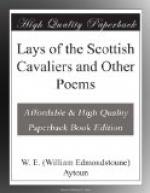Where seed was never sown,
What harvest lay upon thy sands,
By those strong reapers thrown?
What saw the winter moon that night,
As, struggling through the rain,
She poured a wan and fitful light
On marsh, and stream, and plain?
A dreary spot with corpses strewn,
And bayonets glistening round;
A broken bridge, a stranded boat,
A bare and battered mound;
And one huge watch-fire’s kindled pile,
That sent its quivering glare
To tell the leaders of the host
The conquering Scots were there!
XI.
And did they twine the laurel-wreath
For those who fought so well?
And did they honour those who lived,
And weep for those who fell?
What meed of thanks was given to them
Let aged annals tell.
Why should they twine the laurel-wreath—
Why crown the cup with wine?
It was not Frenchman’s blood that
flowed
So freely on the Rhine—
A stranger band of beggared men
Had done the venturous deed:
The glory was to France alone,
The danger was their meed.
And what cared they for idle thanks
From foreign prince and peer?
What virtue had such honeyed words
The exiles’ hearts to
cheer?
What mattered it that men should vaunt,
And loud and fondly swear,
That higher feat of chivalry
Was never wrought elsewhere?
They bore within their breasts the grief
That fame can never heal—
The deep, unutterable woe
Which none save exiles feel.
Their hearts were yearning for the land
They ne’er might see
again—
For Scotland’s high and heathered
hills,
For mountain, loch, and glen—
For those who haply lay at rest
Beyond the distant sea,
Beneath the green and daisied turf
Where they would gladly be!
XII.
Long years went by. The lonely isle
In Rhine’s impetuous
flood
Has ta’en another name from those
Who bought it with their blood:
And though the legend does not live,
For legends lightly die,
The peasant, as he sees the stream
In winter rolling by,
And foaming o’er its channel-bed
Between him and the spot
Won by the warriors of the sword,
Still calls that deep and dangerous ford
The Passage of the Scot.
CHARLES EDWARD AT VERSAILLES
Though the sceptre had departed from the House of Stuart, it was reserved for one of its last descendants to prove to the world, by his personal gallantry and noble spirit of enterprise, that he at least had not degenerated from his royal line of ancestors. The daring effort of Charles Edward to recover the crown of these kingdoms for his father, is to us the most remarkable incident of the last century. It was honourable alike to the Prince and to those




